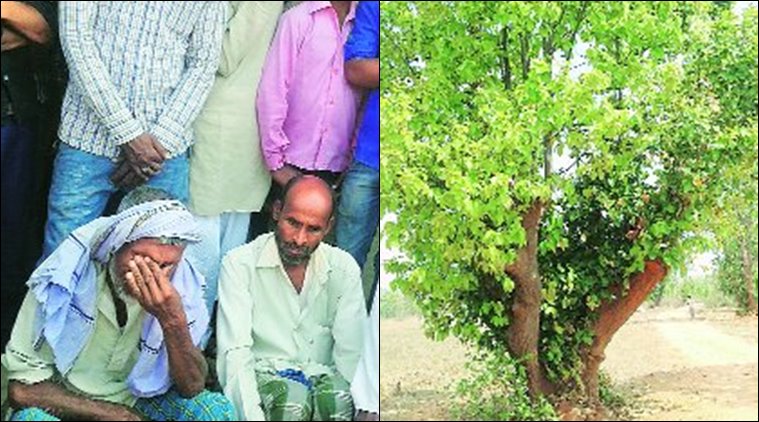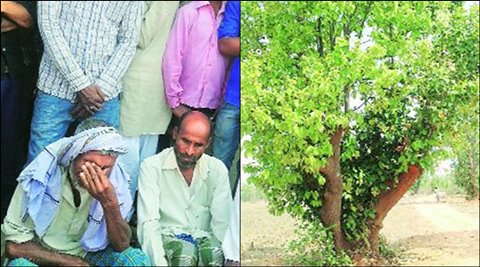 Majloom’s father; the tree from which they were hanged
Majloom’s father; the tree from which they were hanged
The BJP national executive was meeting in New Delhi just a day after a 12-year-old child, Imtiyaz Khan, was hanged to death, along with a 32-year-old cattle trader, Majlum Ansari. They were killed by cow protection vigilantes in the Balumath block of Latehar district in BJP-ruled Jharkhand. The BJP executive committee did not think it necessary to condemn this horrific crime. In the lessons of nationalism that the executive sought to teach the country, the Constitution has no place.
Present at the meeting was Jhakhand Chief Minister Raghubar Das. He had virtually justified the crime. He had said, “There is a lot of cattle-smuggling in the area. Just like Uttarakhand, in Jharkhand trafficking cows across the border is not permissible.” Last year, BJP leaders had justified the Dadri killing of Mohammad Akhlaq on grounds — rather, rumours — that he had killed a cow and eaten beef. Well-intentioned people were scrambling to prove that this was a lie, missing the subtext of the statements that the killing of a cow was a crime that was grave enough to justify death. Similarly, in the context of the lynching in Balumath, the subtext of the chief minister’s statement is that the killing of cattle smugglers is justified.

Imtiyaz Khan’s mother, Najma Khatun, was in her small hut in the remote village of Arhara, when the beaten and broken body of her child was brought down from the tree in the early morning of March 18. A week earlier, the child had consoled his mother promising that he would take care of his sisters. While relating this story to me, her eyes, sore with a million tears, welled up again, “But when he needed us, there was no one to take care of him,” she said. His father Azad Khan had suffered an accident two years earlier and so could not manage the sometimes long and arduous trek of 20 km or more through forests and along stony paths. Since the elder son is disabled, it was left to Imtiyaz to herd the animals to wherever the cattle fairs were held. That day, he took six animals and went along with his father’s friend Majlum, from Nawadah village, who had two bulls for sale. It was safer.
In the fight for secularism, one is often unaware of how the absence of it in different spheres affects ordinary lives. Cattle traders, most of them Muslim, have to plan carefully, to find neighbours who will travel with them, or another trader who is also going to the same fair, before they venture out with their animals, even if, as in the Balumath case, the cattle they are taking for sale are bulls and not cows. The aim of these committees is not so much cow protection as it is to target a community. There are 14 registered FIRs in cases related to so-called cow protection since the BJP took office in Jharkhand — a fraction of the actual number since in most cases, victims are too scared to do so, like Majlum.
Majlum had been targeted by the cow protection gangs earlier. The dregs of society, extortionists, cheats and criminals gang up in the guise of these committees to browbeat Muslim cattle traders like Majlum to pay them for safe passage. Saira Bibi, Majlum’s frail wife, mother of four little girls and a boy, told the police that just a month or so ago, Majlum had been threatened by a group of so-called cow protectors to give up the trade. He took the threats seriously enough to go to their village, Jhabar, meet the group with certificates of cattle sale to prove the legality of his work. But what they wanted was not certificates but money. Those arrested for his murder are from this same village.
Saira says, “If we had the money we would have paid it, but we live a hand-to-mouth existence.” You can feel her grief, it surrounds her, her hands tremble as she rocks her baby, just a few months old. She says “My husband was scared, but he had no alternative. We are landless with no other income, not even a BPL card to lessen our expenses, so he had to take the animals that day.” She carries the burden of earlier tragedies. She is the only surviving daughter of aged parents, having lost five brothers due to illnesses generated by poverty and lack of medical attention. Majlum took over the responsibility and shifted with her and the children to take care of her parents in their village. Now he too is gone.
Most Read 1Chandrayaan-3 mission: Dawn breaks on Moon, all eyes on lander, rover to wake up 2As Indo-Canadian relations sour, anxiety grips Indian students, residents who wish to settle in Canada 3Karan Johar says Sanjay Leela Bhansali did not call him after Rocky Aur Rani: ‘He’s never called me but…’ 4Gadar 2 box office collection day 40: Hit by Shah Rukh Khan’s Jawan onslaught, Sunny Deol movie ends BO run with Rs 45 lakh earning 5Shubh’s tour in India cancelled: Why is the Canada-based singer facing the music?
Majlum’s body showed marks of brutality as did the child’s. This was a hate crime, the nature of which, a hanging of the bodies, was linked to a wider mes-sage: Subordinate yourself to the agenda of Gau Mata or meet the same fate. The killers and their committees have political patronage. For example, in Balumath, a BJP leader runs an outfit called the Gau Raksha Samiti. His Facebook posts include pictures of violence, including one of Bajrang Dal criminals in Shamli publicly parading an injured man, described in the post as a “cow killer”. Some in the lynch gang reportedly belong to his outfit. But he has not been questioned.
To conceal the links, the police spread the lie of a personal dispute, of rivalry between gangs of cattle traders and so on. At the same time, the police chief of the district, Anoop Birtharay, admitted, “These people are criminals. They have previously snatched animals from traders and threatened them.” Precisely. The ideological, political and organisational links between those acting in the name of cow protection and those in power have created an environment in which the police look the other way, until such unspeakable crimes such as the lynching occur.
Also ReadWill reservation really help Indian women?Pratap Bhanu Mehta writes on new Parliament: India’s age of ambitionValues Kota imparted: Anxiety and building a future on a butchered presentWith G20-IMEC plan, the global order shifts to Eurasia
Instead of accountability on these issues, the BJP wants to divert the attention of the country to an utterly falsely premised debate on “nationalism”, based on selective symbols and slogans, such as “Bharat Mata ki Jai”. The politics of Mohan Bhagwat, the RSS chief and Asaduddin Owaisi, the AIMIM leader, represent two sides of the same divisive coin. They both benefit from a communally polarised nation. In 2002, on the 55th anniversary of India’s Independence, from the ramparts of the Red Fort, Atal Bihari Vajpayee chose the slogan not of “Bharat Mata ki Jai” but of “Jai Hind”, which he repeated three times. It is of little consequence to most people precisely because no one slogan can be made mandatory to prove “nationalism”. For the Hindutva agenda, it is the slogan of Bharat Mata as a symbol of “nationalism” today; tomorrow it will be that of “Gau Mata”, as the “national animal” which represents “nationalism”. The result of such politics was seen that early morning on a tree in Balumath.


